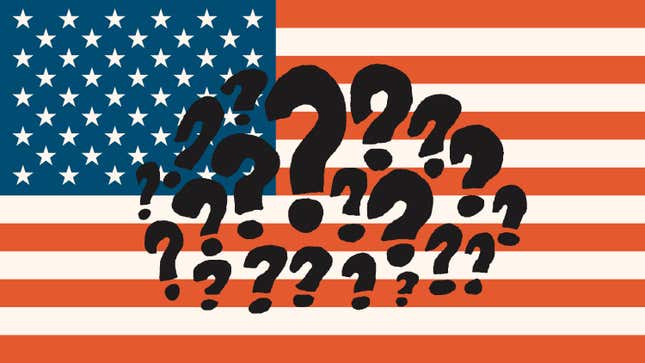Patriotism Felt Wrong and Embarrassing Until I Refused to Let It
When Cory Booker told Judge Ketanji Brown Jackson, "You are a great American,” it laid bare my own unease about earnestly loving this country.
In Depth
Illustration: Angelica Alzona
I am not someone with a lot of love for Congress or any of its members, whom I often refer to as Congressmonsters. I am angry at their frequent dereliction of duty, their deference to lobbyists, their constant running for office rather than serving in it. So for my own sanity, I kept my awareness of Judge Ketanji Brown Jackson’s Supreme Court hearings to a minimum. I did not need to listen to Ted Cruz perform forceful ignorance, or Marsha Blackburn’s aggressive white supremacy, or the Democrats’ mealy-mouthed refusal to tell their worst-behaved colleagues to shut the fuck up.
Yet, someone insisted I watch Senator Cory Booker’s speech, so I did, and I was shocked (and embarrassed, honestly) to find myself sobbing through a strange mixture of emotion: heartbreak swirling with relief, and maybe even hope, and could it be, possibly, some renewed energy, something like inspiration? From his seat in the chamber, Booker did what none of his other Democratic colleagues would: He called out his “demagogic” colleagues, citing the conservative National Review, which had described the ridiculous charges being lobbed at Judge Jackson as “demagoguery.” With a pointedly happy expression and upbeat tone, he vowed to Judge Jackson that he would not let his joy at her presence be stolen by those people.
Patriotism, lately, for me and (I think) others like me, feels wrong and embarrassing, because I associate it with the worst kinds of racists and reactionaries. I could not—or at least did not bother to—imagine earnestly being a patriot, when the people who most loudly identified as patriots were people whose behavior I found abhorrent. But Booker’s speech raised an unspoken question: What else are we letting be stolen by people who are by admission of their own side “demagogic?” By its end, I was reconsidering a recent idea I’d had to put a Black Lives Matter sign up in my apartment window in the small, politically purple, rural town where I live. I am now thinking I might also put up an American flag.
I do not feel what I would consider a flag-waving kind of patriotism. Yet I do care for this country, and I am a citizen of this country. I helped start an antiracism project at my local library, and I meet with my neighbors to read books about community and against tyranny, because of something not wholly unrelated to patriotism that is absolutely rooted in love of country. What if refusing to allow the American flag to be a hate symbol is part of the active citizenship, the critical patriotism, that I am compelled by? What if it could represent not something angry and antiquated and obsessed with an old way of power, but an active, living thing that we tend and grow?
-

-

-

-

-

-

-

-

-

-

-

-

-

-

-

-

-

-

-

-

-

-

-

-

-

-

-

-

-

-

-

-

-

-

-

-

-

-

-

-








































